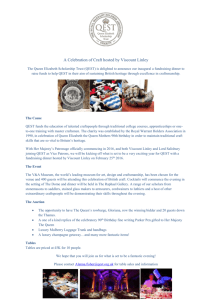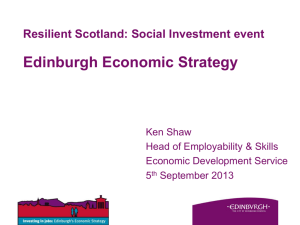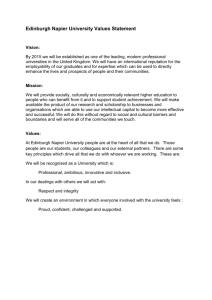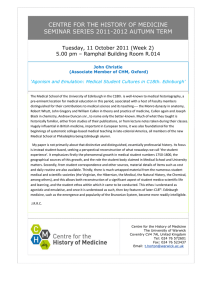Supporting crossover between quantitative modelling communities: final report 1 Background
advertisement
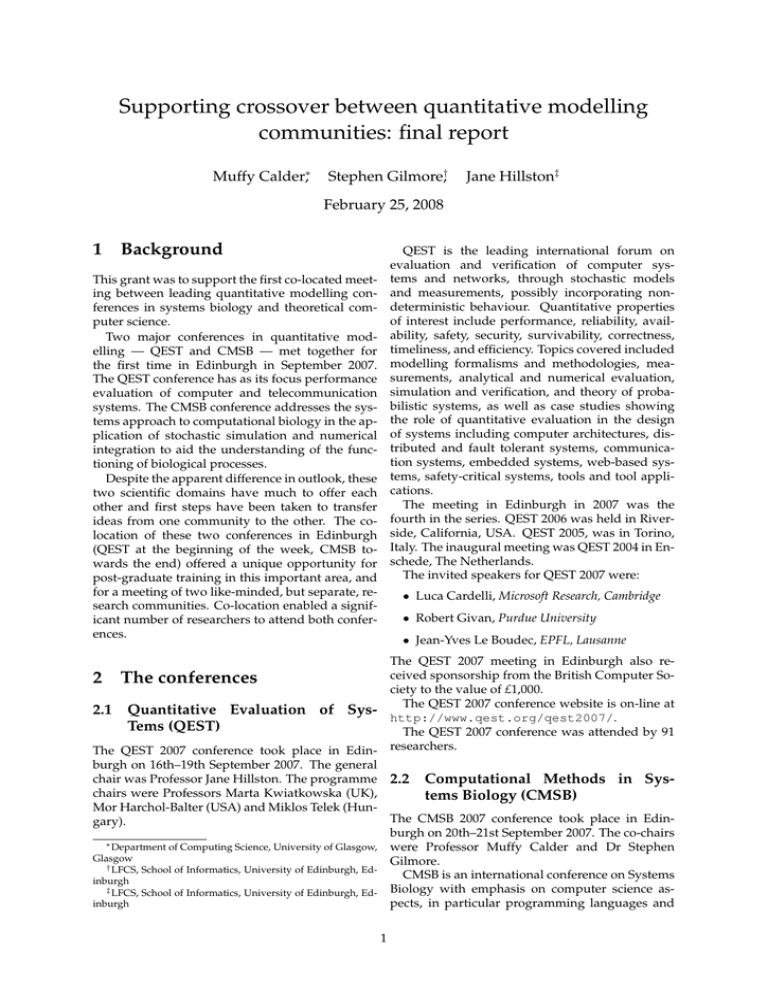
Supporting crossover between quantitative modelling communities: final report Muffy Calder∗, Stephen Gilmore†, Jane Hillston‡ February 25, 2008 1 Background QEST is the leading international forum on evaluation and verification of computer systems and networks, through stochastic models and measurements, possibly incorporating nondeterministic behaviour. Quantitative properties of interest include performance, reliability, availability, safety, security, survivability, correctness, timeliness, and efficiency. Topics covered included modelling formalisms and methodologies, measurements, analytical and numerical evaluation, simulation and verification, and theory of probabilistic systems, as well as case studies showing the role of quantitative evaluation in the design of systems including computer architectures, distributed and fault tolerant systems, communication systems, embedded systems, web-based systems, safety-critical systems, tools and tool applications. The meeting in Edinburgh in 2007 was the fourth in the series. QEST 2006 was held in Riverside, California, USA. QEST 2005, was in Torino, Italy. The inaugural meeting was QEST 2004 in Enschede, The Netherlands. The invited speakers for QEST 2007 were: This grant was to support the first co-located meeting between leading quantitative modelling conferences in systems biology and theoretical computer science. Two major conferences in quantitative modelling — QEST and CMSB — met together for the first time in Edinburgh in September 2007. The QEST conference has as its focus performance evaluation of computer and telecommunication systems. The CMSB conference addresses the systems approach to computational biology in the application of stochastic simulation and numerical integration to aid the understanding of the functioning of biological processes. Despite the apparent difference in outlook, these two scientific domains have much to offer each other and first steps have been taken to transfer ideas from one community to the other. The colocation of these two conferences in Edinburgh (QEST at the beginning of the week, CMSB towards the end) offered a unique opportunity for post-graduate training in this important area, and for a meeting of two like-minded, but separate, research communities. Co-location enabled a significant number of researchers to attend both conferences. 2 2.1 • Luca Cardelli, Microsoft Research, Cambridge • Robert Givan, Purdue University • Jean-Yves Le Boudec, EPFL, Lausanne The QEST 2007 meeting in Edinburgh also received sponsorship from the British Computer Society to the value of £1,000. The QEST 2007 conference website is on-line at http://www.qest.org/qest2007/. The QEST 2007 conference was attended by 91 researchers. The conferences Quantitative Evaluation of SysTems (QEST) The QEST 2007 conference took place in Edinburgh on 16th–19th September 2007. The general chair was Professor Jane Hillston. The programme chairs were Professors Marta Kwiatkowska (UK), Mor Harchol-Balter (USA) and Miklos Telek (Hungary). 2.2 Computational Methods in Systems Biology (CMSB) The CMSB 2007 conference took place in Edinburgh on 20th–21st September 2007. The co-chairs ∗ Department of Computing Science, University of Glasgow, were Professor Muffy Calder and Dr Stephen Glasgow Gilmore. † LFCS, School of Informatics, University of Edinburgh, EdCMSB is an international conference on Systems inburgh ‡ LFCS, School of Informatics, University of Edinburgh, EdBiology with emphasis on computer science asinburgh pects, in particular programming languages and 1 3.2 logical formalisms for describing, modelling, simulating and analysing cellular pathways (e.g., signalling, metabolic and control), and higher-level aspects, such as intercellular signalling or development. Topics covered included the application of formal methods to analyse biomolecular systems such as formal models for regulatory, signalling or metabolic networks. Both qualitative or quantitative analyses of biomolecular systems were considered, with quantitative models expressed in differential, discrete and/or stochastic modellinglanguage frameworks. We note that numerical evaluation of stochastic process models was covered in both CMSB and QEST. CMSB 2007 was the fifth in this series of conferences. CMSB 2006 was held at the Microsoft Research–University of Trento Centre for Computational and Systems Biology in Trento, Italy. CMSB 2005 was co-located with the ETAPS computer science conference in Edinburgh, Scotland, chaired by Gordon Plotkin. The 2004 event was held in Paris under the joint chairmanships of Vincent Danos and Vincent Schachter. The inaugural meeting was the 2003 event in Trento, under the chairmanship of Corrado Priami. The invited speakers for CMSB 2007 were: Proceedings of the conference were published by Springer in the Lecture Notes in Bioinformatics (LNBI) series: Computational Methods in Systems Biology, International Conference CMSB 2007, Edinburgh, Scotland, September 2007 Proceedings, Muffy Calder, Stephen Gilmore (Eds.), LNBI volume 4695, 2007. A special issue of Theoretical Computer Science (Series C) has been agreed and is currently in preparation. The volume will include 6 invited papers, 1 paper from an invited speaker (Girolomi) and an overview paper by Calder and Gilmore. 4 • Mark Girolami, University of Glasgow The CMSB conference also received sponsorship from the e-Science Institute (to the value of £2,600 for speaker costs) and Microsoft Research, Cambridge (to the value of £1,000). The CMSB 2007 conference website is online at http://conferences.inf.ed.ac.uk/ cmsb07. The CMSB 2007 conference was attended by 85 researchers. 3.1 Research impact and benefit to society A significant outcome of this support was that it allowed Dr Dan Gillespie to spend some time in the UK. Gillespie is a remarkable scientist who did seminal work on a stochastic algorithm for chemical reactions in the 1970’s. His work is now highly relevant to systems biology and it was a privilege to hear him talk about his original work and subsequent refinements (he is now retired, but this appears to be a theoretical concept!). Not only did he make a huge impact on his audience at the CMSB conference talk but he attended every single talk and engaged in numerous discussions with researchers (so much so that he kept missing lunch). Furthermore, he gave well publicised and well attended seminars at Edinburgh and Strathclyde Universities. The other direct beneficiaries of this grant were the PhD students who had their experience of the scope and application of quantitative methods enriched, and their horizons widened to encompass applications of stochastic and quantitative modelling in other disciplines. The future economic and social prosperity of the UK depends on having a substantial pool of post-graduates and researchers with interdisciplinary skills. • Daniel T. Gillespie, Dan T. Gillespie Consulting, Castaic, California 3 CMSB Dissemination QEST Proceedings of the conference were published by IEEE Computer Society Press as Fourth International Conference on the Quantitative Evaluation of Systems, Mor Harchol-Balter, Marta Kwiatkowska and Miklos Telek (Eds.), 2007. Following on from the conference, a special issue of IEEE Transactions on Software Engineering on Quantitative Evaluation of Computer Systems is in preparation. The guest editors for the issue are Jane Hillston, Marta Kwiatkowska and Miklos Telek. Submission for the special issue closed in mid-January. Papers are presently under review. 5 Explanation of expenditure Costs were for speakers, PhD students, and a joint conference reception. Actual expenditure was pretty much as planned, although some virement across headings was necessary to allow Gillespie’s extended visit. Note that each conference had one invited speaker from USA and one from Europe. The joint reception was held in the Fellow’s Library, Royal College of Surgeons, Edinburgh. It was extremely well attended by both communities 2 and provided a good opportunity for informal discussion. 5.1 ally because an academic at the university was a member of the conference programme committee or steering committee. Usually, that member of the academic staff was the PhD supervisor of the student who was applying. Awards of QEST and CMSB Student Bursaries 5.1.3 We wanted to check about the allowability of these on the EPSRC grant so we contacted Pamela Mason at EPSRC by telephone on 3rd July 2007. She informed us that we could award bursaries to any student irrespective of funding source and nationality but that the EPSRC would prefer that we prioritised EPRSC students over non-EPSRC first, and then after that UK over non-UK (but it is still perfectly OK to award a bursary to a non-UK student). The meaning of “prioritise” here is to decide in favour of the UK student (say) in preference to an otherwise equal student from France (say), not that all EPSRC and UK applications must be funded irrespective of merit before any non-UK application is considered. We acted on this advice in assigning bursaries. 5.1.1 We received three applications where we decided not to award any funds. This information is detailed in Table 5. In these cases there was no evident connection between the academic institution and the conferences or between the research work of the PhD students and the academic subjects of interest to the conferences. None of the above students submitted a paper to either conference, so we had no clear evidence of interest. Geographic distance was also an important factor in these applications, with travel costs being so high that we were not sure that the applicants could bear these costs themselves. We were also running short of funds at this stage, due to following the agreed policy of prioritising EPSRC-funded students first, UK-based students second, and others last. Applications from UK students 5.1.4 We received five applications from students currently in receipt of EPSRC funding, and made the awards of bursaries indicated in Table 1. We received nine applications from students not currently in receipt of EPSRC funding, but studying for PhDs at UK universities. These applications are detailed in Table 2. 5.1.2 Applications not funded Summary of expenditure on student bursaries We are confident that no EPSRC or UK student has been disadvantaged. The assignments of bursaries have taken account of location in that (for example) accommodation costs are not paid to any Edinburgh applicant (because they already have a residence in Edinburgh). Where the amount spent on accommodation was less than the amount of the bursary we agreed to pay reasonable subsistence costs to the students up to the value of the award made. The summary statistics are as follows. Applications from non-UK students We received seven applications from students studying for PhDs outside the UK. We supplemented these bursary awards with sponsorship money obtained from the British Computer Society (BCS) for the QEST conference and sponsorship money obtained from Microsoft Research, Cambridge (Microsoft) for the CMSB conference. In three cases (McQuinn, Pradalier, and Rizk below) these students were co-authors of a paper accepted to one or other of the conferences. A further three of these applications came from students who had a poster accepted at QEST (Dinulescu, Remke and Taylor). This is very clear evidence of interest in the subject matter of the conferences. Our award to Schabauer was declined by him after his plans changed. Applications from non-UK students in Europe are shown in Table 3. Applications from non-UK students outside Europe are shown in Table 4. All of the students who accepted our bursary awards came from good academic institutions where there was a clear connection to the communities of the QEST and CMSB conferences, usu- Bursaries for attendance at QEST only Bursaries for attendance at CMSB only Joint bursaries for attendance at both Total available from grant to spend: Total spend on student bursaries: 10 9 3 £7450 £7390 Because the conferences are located in Edinburgh they are very convenient and therefore naturally attractive to students who are presently studying in Edinburgh. Consequently more bursary applications came from Edinburgh than from any other city. However, the grant holders wish to point out that none of the students who received bursaries are supervised by any of the grant holders. The grant holders intended the money to be used to grow the quantitative modelling community and to increase participation at the conferences from outside the existing community, and therefore instructed their own students not to apply for bursaries. 3 Student Chen, Chih-Chun Affiliation UCL, UK Komorowski, Michal Kwiatkowski, Marek Warwick, UK Edinburgh, UK Murphy, Elaine Edinburgh, UK Imperial, UK Wagner, Daniel Applied to QEST CMSB X X X X X Awarded CMSB student registration (£170) plus accommodation (£150) CMSB student registration (£170) plus accommodation (£150) QEST tutorial registration (£75) plus QEST student registration (£285) plus CMSB student registration (£170) CMSB student registration (£170) QEST tutorial registration (£75) plus QEST student registration (£285) plus accommodation (£200) Subtotal of EPSRC spend: £1900 X Table 1: Applications from EPSRC-funded students Student Bergmann, Daniel Affiliation Nottingham Gkargkas, Konstantinos Gorry, Benjamin Manchester Applied to QEST CMSB X X X Kalapanulak, Saowalak Pedersen, Michael HeriotWatt, Edinburgh HeriotWatt, Edinburgh Edinburgh Edinburgh X Rutkowski, Michał Warwick X Saithong, Treenut Trivedi, Ashutosh Edinburgh Warwick X Grov, Gudmund X Awarded CMSB student registration (£170) plus accommodation (£150) CMSB student registration (£170) plus accommodation (£150) QEST tutorial registration (£75) plus QEST student registration (£285) QEST tutorial registration (£75) plus QEST student registration (£285) X CMSB student registration (£170) X QEST tutorial registration (£75) plus QEST student registration (£285) plus CMSB student registration (£170) QEST tutorial registration (£75) plus QEST student registration (£285) plus accommodation (£200) CMSB student registration (£170) QEST tutorial registration (£75) plus QEST student registration (£285) plus accommodation (£200) Subtotal of EPSRC spend: £3350 X Table 2: Applications from non-EPSRC funded students in the UK 4 Student Pradalier, Sylvian Affiliation Paris, France Remke, Anne Twente, Netherlands Rizk, Aurélien Paris, France Vienna, Austria Schabauer, Hannes Applied to QEST CMSB X X X X X Awarded QEST tutorial registration (£75) plus QEST student registration (£285) plus CMSB student registration (£170) [plus accommodation (£300, Microsoft)] QEST tutorial registration (£75) plus QEST student registration (£285) [plus accommodation (£200, BCS)] CMSB student registration (£170) [plus accommodation (£200, Microsoft)] Award declined by student Subtotal of EPSRC spend: £1060 Table 3: Applications from non-UK students in Europe Applied to QEST CMSB X Student Dinulescu, Monica Affiliation McGill, Canada McQuinn, Michael Illinois, USA X Taylor, Jonathan McGill, Canada X Awarded QEST tutorial registration (£75) plus QEST student registration (£285) [plus accommodation (£200, BCS)] QEST tutorial registration (£75) plus QEST student registration (£285) [plus accommodation (£200, BCS)] QEST tutorial registration (£75) plus QEST student registration (£285) [plus accommodation (£200, BCS)] Subtotal of EPSRC spend: £1080 Table 4: Applications from non-UK students outside Europe Student Baig, Mirza Saqib Affiliation CDRI, India Issa, Ntegeka IICT, Uganda CDRI, India Saeed, Uzma Applied to QEST CMSB X X Awarded No award Application incomplete No award X No award X Subtotal of EPSRC spend: £0 Table 5: Applications which were not funded 5 6 Further activities Following the success of both conferences, they will be held again: QEST in September 2008 in St. Malo, France and CSMB in October 2008 in Rostock, Germany. One of the invited speakers at CMSB 2008 will be Jane Hillston. 6
